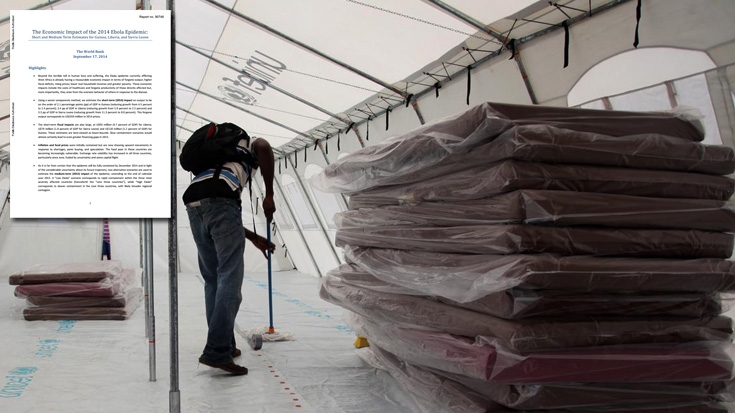A new World Bank report outlines the short and medium-term toll the Ebola crisis could take on the three most heavily affected countries – Guinea, Liberia and Sierra Leone – if those countries and their partners don’t immediately ramp up efforts to contain the disease outbreak. Estimates of the impact on the three countries for 2015 range from $97 million (if the epidemic is rapidly contained) to $809 million (if control of the epidemic is delayed).
Guinea
The impact is already evident in Guinea, Liberia and Sierra Leone, the three countries with the highest number of Ebola cases. Early estimates for growth in Guinea have been halved from 4.5% to 2.4% as a result of the disease. Already among the poorest countries in West Africa with a population of 12 million, Guinea has seen the biggest losses in its agriculture industry. An exodus of farm workers from the countryside has meant lower exports of key products like cocoa and palm oil.
Sierra Leone
Sierra Leone, once navigating toward Middle Income status at an 11.3% annual growth rate could see growth of only 8% in 2014 and zero in 2015. The disease has spread to all but one of the country’s 13 districts, with four doctors and 30 nurses among the dead. The country has been devastated by restrictions on international travel, the closing of markets, disruption of farming activities and a slow-down in critical mining operations as a result of foreign workers fleeing the country for fear of contracting Ebola.
Liberia
Liberia is currently the country worst affected by the Ebola crisis. The virus has spread quickly, rates of infection are surging and deaths continue to rise. According to the report: “The largest economic effects of the crisis are not the direct costs (mortality, morbidity, caregiving, and the associated losses to working days),” the report reads, “but rather those resulting from changes in behavior–driven by fear–which have resulted in generally lower demands for goods and services and consequently lower domestic income and employment.”
The country could see negative growth rates in 2015—if Ebola is not quickly contained—impacted by the closure of one the country’s two major mining companies as a result of the disease outbreak and by disruptions to farming and agriculture. The services sector has also been affected. Liberia has seen incoming commercial flights slump from 27 per week to just six. Some hotels have reported occupancy rates as low as 10% leading many hotel workers to lose their jobs.
So far, neighboring countries have had limited economic impacts as a result of the epidemic, but that could change if measures are not taken to quickly contain the disease and prevent its spill-over, the report warns. Countries that could be affected include Nigeria, Cote d’Ivoire, Guinea-Bissau, Senegal and The Gambia.
The overall impact of Ebola is evident in two distinct areas, the report reads. First are the direct and indirect effects of sickness and death. Second are the behavioral effects resulting from peoples’ fear of a spreading epidemic, which in turn leads to a fear of interacting with others, closes the workplace, disrupts transportation and panics governments and businesses into closing seaports and airports.
